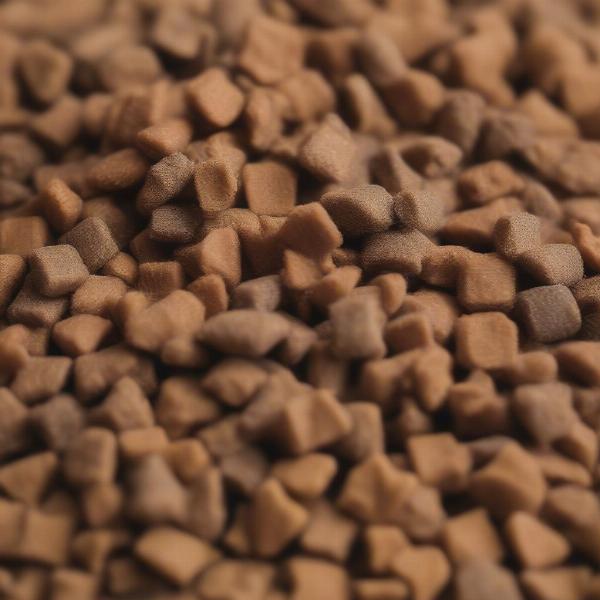Big kibble dog food is often marketed towards larger breeds, but is it always the best choice? This article will delve into the benefits and drawbacks of large-sized kibble, helping you determine whether it’s suitable for your furry friend’s needs. We’ll cover everything from the impact on dental health to considerations for different breeds, ages, and eating habits.
Understanding the Appeal of Big Kibble
Larger kibble pieces can offer several advantages for certain dogs. Many owners find that big kibble encourages slower eating, which can be beneficial for dogs prone to gulping down their food. This can help prevent choking and digestive upset. Additionally, the larger size can promote chewing, potentially contributing to better dental hygiene by scraping away plaque and tartar buildup.
 Large Kibble Dog Food
Large Kibble Dog Food
Is Big Kibble Right for Your Dog?
While big kibble offers potential benefits, it’s not a one-size-fits-all solution. Consider your dog’s breed, age, and individual eating habits. Small breeds or dogs with dental issues might struggle with large kibble, potentially leading to choking hazards or discomfort. Puppies and senior dogs also may require smaller, easier-to-chew kibble.
Breed Considerations
Large and giant breeds often benefit from big kibble. The larger size is more proportionate to their jaws and can encourage them to chew thoroughly. However, even within large breeds, individual preferences can vary. Always observe your dog’s eating habits to ensure they can comfortably handle the kibble size.
Age and Dental Health
Puppies and senior dogs often have more delicate teeth and gums. For these age groups, smaller kibble or softened food might be more appropriate. If your dog has dental disease or missing teeth, consult your veterinarian for recommendations on the best food texture and size.
Addressing Gulping and Bloat
Big kibble can be a helpful tool for dogs who gulp their food, potentially reducing the risk of choking and digestive problems. However, for deep-chested breeds prone to bloat, managing meal portions and feeding frequency are crucial, regardless of kibble size.
Choosing the Right Big Kibble
When selecting big kibble, look for high-quality ingredients and a formula tailored to your dog’s age, breed, and activity level. Consult your veterinarian for personalized recommendations. Also, check the kibble size and shape. Some brands offer different “large breed” formulas with varying kibble dimensions. Experiment with different brands and sizes to find what works best for your dog.
Conclusion
Big kibble dog food can be a beneficial choice for many dogs, particularly larger breeds, by encouraging slower eating and potentially promoting dental health. However, it’s essential to consider your dog’s individual needs and preferences. By carefully evaluating your dog’s breed, age, dental health, and eating habits, you can make an informed decision about whether big kibble is the right choice for your furry companion.
FAQs
- Is big kibble suitable for all dog breeds? Not necessarily. Small breeds and those with dental issues might find it difficult to chew.
- Can big kibble prevent bloat? While it can help slow down eating, bloat prevention requires a multi-faceted approach, including portion control and feeding frequency management.
- What should I do if my dog struggles to eat big kibble? Try switching to a smaller size or softening the kibble with water. Consult your veterinarian if the problem persists.
- How do I know if my dog is choking on big kibble? Signs of choking include gagging, pawing at the mouth, and difficulty breathing. Seek immediate veterinary attention if you suspect your dog is choking.
- Are there any disadvantages to feeding big kibble? Some dogs might find it less palatable, and it may not be suitable for all breeds or ages.
Related Articles on ILM Dog
ILM Dog is your trusted international resource for all things canine. We offer expert advice on everything from breed selection to nutritional guidance. Our focus is on providing practical, reliable information to help you provide the best possible care for your canine companion. We specialize in breed selection, health and medical care, training, nutrition, grooming, and product recommendations. Contact us today for personalized support! Email: [email protected] Phone: +44 20-3965-8624. Visit ILM Dog for more information.